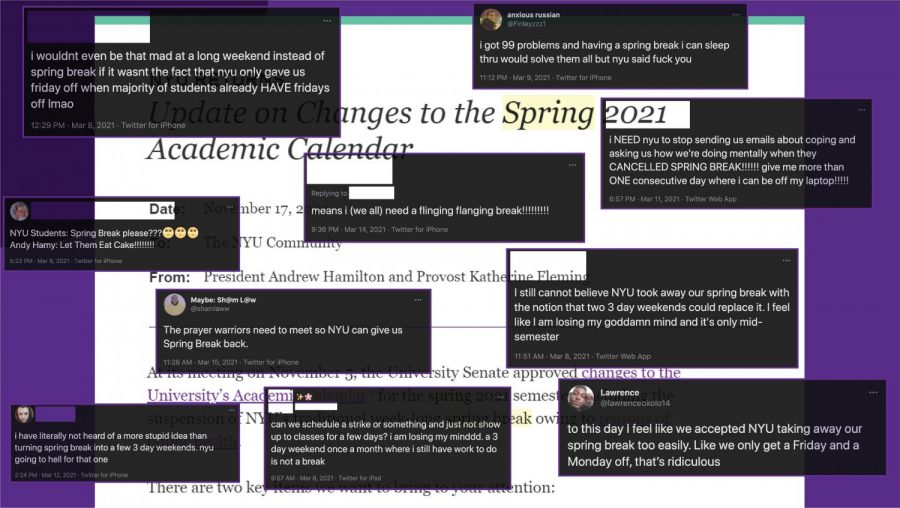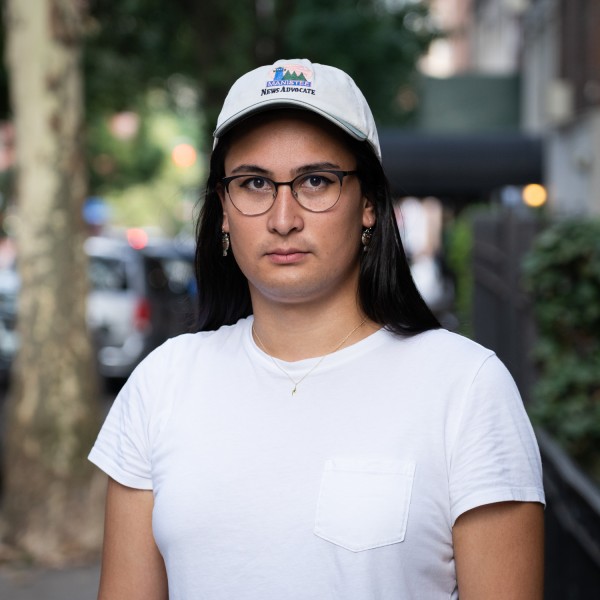As spring approaches, break doesn’t
Students believe replacing spring break with two long weekends is detrimental to their mental health. Administrators remain confident in their plans.
NYU administration announced the cancellation of the 2021 spring break to mitigate the spread of COVID-19. Many students are expressing their concerns about the lack of a substantial break given during the spring semester. (Staff Illustration by Manasa Gudavalli and Alexandra Chan)
March 16, 2021
An Oct. 20 message from President Andrew Hamilton and Provost Katherine Fleming announced the cancellation of 2021’s spring break plans to mitigate the spread of COVID-19. In its place, the University Senate and the Senate Academic Affairs Committee extended winter break by three days and created two three-day weekends on Friday, March 19 and Monday, April 19.
“The Senate Executive Committee adopted the Student Senators Council’s recommendation to designate two long weekends during the semester (in addition to President’s Weekend) to give everyone a bit of a breather,” Hamilton and Fleming wrote in the message. “We will be particularly attentive throughout the spring semester to issues of wellness, self-care, and stress relief for students, faculty, and staff.”
However, some students believe these shorter breaks do not replace the mental health benefits of a full spring break. Although she is no stranger to heavy course loads and extracurricular commitments, Tisch senior Bobbie Boettinger told WSN that she has never before been so burnt out, as three semesters of online classes have taken their toll.
“It’s just a different type of exhaustion,” Boettinger said. “This isn’t just an NYU problem. This is a problem for students all across the country.”
Boettinger emailed her professors asking them to cancel classes during what would have been spring break week, as NYU Local previously reported. After one professor agreed, Boettinger posted about her success on Twitter, and other students asked her to share a template so they could contact their own professors. Boettinger said she sent templates to NYU students as well as students at a few other universities, adding that she heard a number of them were successful.
According to Nicky Nenkov, a Global Liberal Studies senior and the chair of the Student Government Assembly, when the Senate Executive Committee first discussed the idea of eliminating spring break last fall, the plan was to extend winter break by a week and continue the semester with no breaks. That initial recommendation passed by a slim margin.
“The thought process wasn’t like, ‘Instead of having a spring break, we’re going to have three-day weekends,’” Nenkov said. “The thought process at first was like, ‘We’re not going to have spring break.’ And then on our side, it was like, ‘OK, can we at least have some three-day weekends?’”
Nenkov and their colleagues proposed alternatives to the conventional break — including four-day weekends and distributing more off-days throughout the semester — to senior administrators such as Dr. Carlo Ciotoli, the Associate Vice President for Student Health and the Executive Lead of the COVID-19 Prevention & Response Team. Ciotoli and other administrators wanted to cancel the break, but they ultimately reached a compromise replacing the week-long spring break with two three-day weekends.
“Compared to having a full break, this is sh-t, of course,” Nenkov said. “For some people it might be something worth looking forward to. I realize it’s not in any way a good solution, but it’s also helping some people instead of helping no one, and that’s better.”
In an Oct. 26 message to students, Ciotoli provided additional explanations for the cancellation of spring break. Although sympathetic to arguments for student mental health, he wrote, the risks presented by spring break travel and gatherings and the difficulty of banning them necessitated the decision.
Boettinger recognizes the safety issues that travel presents, but felt mental health should be emphasized as much as COVID-19 precautions.
“We’re not trying to put anyone’s lives at risk with traveling,” Boettinger said. “We just want a resting period to catch up on our own self-care and mental health, and not catch up on assignments, and Zoom, and the stress of school.”
Similarly, Gabriel Williams, a graduate student at the Silver School of Social Work, said there seems to be a contradiction between words and actions. Williams said he feels like the university has neither provided enough mental health resources nor done enough to promote existing resources.
“How does this school preach about mental health and then not give their students a break?”, Williams asked.
In an email statement to WSN, university spokesperson John Beckman cited a number of email communications sent to students this semester regarding mental health. The Wellness Exchange was the primary resource promoted in these messages. One letter to faculty offered suggestions on how professors could support their students’ mental health and well-being.
Boettinger believes such messages are insufficient in the context of the pandemic. Though her advisers and some of her professors have shown they care about mental health, she feels that NYU as a whole is sending the message that assignments come first.
“I just feel like they’ve been doing whatever they normally do, and send out email blasts about it,” Boettinger said regarding NYU’s support for student mental health. “I feel like a lot of professors just put the wellness center in their syllabus and call it a year.”
Boettinger noted the combined difficulty of managing academic anxiety as well as the anxiety of living during COVID-19. Erin Love, the COVID-19 Incentive Program Manager at the University of California at Davis, shares that concern.
“School is hard, and the pandemic is hard,” Love said. “I think that giving the students a break, even just a week to decompress, a week to not have to do anything, is really beneficial.”
Unlike NYU, the University of California uses the quarter system, meaning that without spring break, UC Davis students would go directly from winter quarter finals to spring quarter classes. This year, UC Davis students received a full week of break and were also able to apply for $75 grants in the form of gift cards to local businesses — provided they take a COVID test during the week of spring break — as first reported by ABC10.
“You get to stay in town, you get to have a vacation, you get to try something new, and you’re helping protect the community,” Love said.
Williams and Boettinger share concerns about NYU’s attempts to protect its community by cancelling spring break altogether. They believe this does not effectively prevent travel, as students who intend to travel will do so regardless of whether or not classes are cancelled.
“What is stopping anyone from going on vacation right now whenever we can do all of our studies remotely,” Williams said.
Boettinger said she knows students who have decided to travel while attending classes remotely.
Beckman wrote that travel was “definitely one source of concern” involved in the revision of the Spring 2021 semester academic calendar, but did not address a question about how the university was prepared to handle the issue of students choosing to travel anyway.
Ciotoli’s Oct. 26 message acknowledged that it would be nigh impossible to implement a “spring break travel ban,” citing those difficulties as one reason for canceling spring break. He also wrote that student stress could be relieved by the two three-day weekends, which were extended to most staff and administrators in a Feb. 24 message from Hamilton titled “We Could All Use a Day Off.”
Boettinger thinks the planned days off are anything but for students. She said she is still expected to complete assignments and prepare for exams over the designated breaks, despite a Nov. 17 message from Hamilton and Fleming urging faculty to avoid assigning work over the three-day weekends.
“I don’t think it’s going to help at all — maybe for some, because I can’t speak for everyone,” Boettinger said. “But from what I have heard, it’s not a break.”
Beckman acknowledged that the circumstances represent “another challenge in a year of tough challenges,” but emphasized the importance of prioritizing community health during the pandemic. He said that the university sees the shortened breaks as a solution.
“We believe that the 3 day weekends are a good if not perfect way to provide some respite and relaxation to the students and employees of NYU during the spring semester,” Beckman wrote.
Unlike all undergraduate and some graduate schools at NYU, Williams’ graduate program in Silver does not recognize the revised schedule and is proceeding with the original weeklong break. He described this conventional spring break as an advantage — students can choose to use the time to work on midterms, but also have the option to relax and recharge. Without spring break and the opportunity to step back from their work, Williams said that undergraduate students could suffer academically as well as emotionally.
“You’re just setting them up for failure because they’re going to be burnt out,” Williams said.
Email Alex Tey at [email protected].




























































































































































